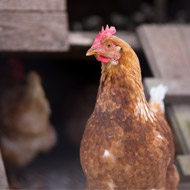Pirbright receives funding for avian flu research

One of the most recent avian flu strains to transmit from birds to humans was H7N9
The Pirbright Institute has received funding to research how fast avian influenza can adapt to infect mammalian hosts. It is hoped that the research will help scientists identify which strains may pose a threat to humans and potentially cause the next pandemic.
Lead researcher Dr Holly Shelton, said: “Understanding more about how flu viruses change in hosts will help us to know what genetic characteristics to look out for when predicting the next strains that could cause human pandemics.
“We want to know how quickly mutations can appear that allow H9N2 to infect mammals if other strains have the potential to adapt at the same rate, and what features help them to adapt to mammals so rapidly.”
In recent years, the speed at which avian flu viruses can infect humans has become of great concern. One of the most recent avian flu strains to transmit from birds to humans was H7N9, which has infected more than 1500 people since 2013 and has a 40 per cent mortality rate.
Whilst there is not yet any evidence to suggest that H7N9 is able to transmit human-to-human, there is no way to tell if it will do so in the future.
Previous research by the Influenza Viruses group at Pirbright revealed that avian flu strain H9N2 is able to quickly adapt the viral genes involved in replication during infection of mice.
Since the H9N2 strain is known to have donated genetic material to the H7N9 virus, it may have transmitted crucial traits that improve its ability to infect humans. The scientists are therefore looking at the H9N2 genes to see what features they give the virus which enable it to rapidly adapt to a non-avian host.
Researchers say their study will aid decisions about flu eradication and control strategies in the avian population, which in turn will prevent spill-over public health events.



 The RCVS has announced a new version of its 1CPD mobile app, with enhanced features for veterinary surgeons and veterinary nurses to record their continuing professional development.
The RCVS has announced a new version of its 1CPD mobile app, with enhanced features for veterinary surgeons and veterinary nurses to record their continuing professional development.